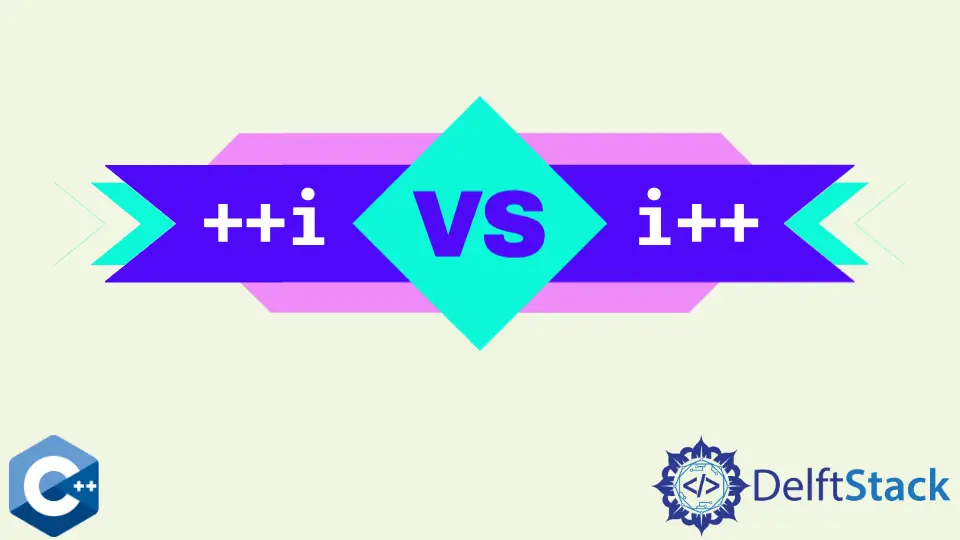C++ 中的前递增 VS 后递增运算符

本文将介绍 C++ 中前自增和后自增的区别。
C++ 中预增和后增运算的区别
这两种操作都基于一元增量运算符 - ++,当在访问变量值的表达式中使用时,它的行为略有不同。通常,变量可以在之后或之前与递增或递减运算符组合,从而产生更大/更小 1 的值。但请注意,预递增操作首先修改给定的变量,然后访问它。另一方面,后递增运算符访问原始值,然后递增它。因此,当在访问或存储值的表达式中使用时,运算符可以对程序产生不同的影响。例如,以下示例代码将两个整数初始化为 0 值,然后迭代五次,同时使用不同的运算符输出每个整数的递增值。请注意,后增量以 0 开始打印并以 4 结束,而预增量以 1 开始并以 5 结束。尽管如此,存储在两个整数中的最终值是相同的 - 5。
#include <iostream>
using std::cout;
using std::endl;
int main() {
int i = 0, j = 0;
while ((i < 5) && (j < 5)) {
cout << "i: " << i++ << " ";
cout << "j: " << ++j << endl;
}
cout << "End of the loop, both have equal values:" << endl;
cout << "i: " << i << " "
<< "j: " << j << endl;
exit(EXIT_SUCCESS);
}
输出:
i: 0 j: 1
i: 1 j: 2
i: 2 j: 3
i: 3 j: 4
i: 4 j: 5
End of the loop, both have equal values:
i: 5 j: 5
或者,在 for 循环的条件表达式中使用不同的符号表现相同。两个循环都执行 5 次迭代。尽管如此,使用预增量通常是公认的风格,当代码未优化时,这可能是一种更高效的变体。
#include <iostream>
using std::cout;
using std::endl;
int main() {
int i = 0, j = 0;
while ((i < 5) && (j < 5)) {
cout << "i: " << i++ << " ";
cout << "j: " << ++j << endl;
}
cout << "End of the loop, both have equal values:" << endl;
cout << "i: " << i << " "
<< "j: " << j << endl;
cout << endl;
for (int k = 0; k < 5; ++k) {
cout << k << " ";
}
cout << endl;
for (int k = 0; k < 5; k++) {
cout << k << " ";
}
cout << endl;
exit(EXIT_SUCCESS);
}
输出:
i: 0 j: 1
i: 1 j: 2
i: 2 j: 3
i: 3 j: 4
i: 4 j: 5
End of the loop, both have equal values:
i: 5 j: 5
0 1 2 3 4
0 1 2 3 4
不要将后递增和前递增操作与相同变量的其他算术运算一起使用
请注意,当与同一变量一起使用时,后增量和前增量运算符可能会使算术计算完全错误。例如,将后增量与相同变量的乘法相结合会使代码不直观,如果处理不当甚至容易出错。
#include <iostream>
#include <vector>
using std::cout;
using std::endl;
using std::vector;
int main() {
vector<int> vec1 = {10, 22, 13, 41, 51, 15};
for (int &k : vec1) {
cout << k++ * k << ", ";
}
exit(EXIT_SUCCESS);
}
输出:
110, 506, 182, 1722, 2652, 240,
Founder of DelftStack.com. Jinku has worked in the robotics and automotive industries for over 8 years. He sharpened his coding skills when he needed to do the automatic testing, data collection from remote servers and report creation from the endurance test. He is from an electrical/electronics engineering background but has expanded his interest to embedded electronics, embedded programming and front-/back-end programming.
LinkedIn